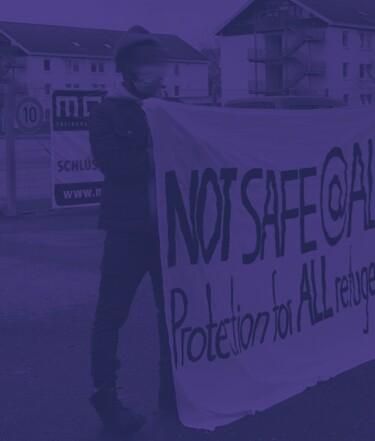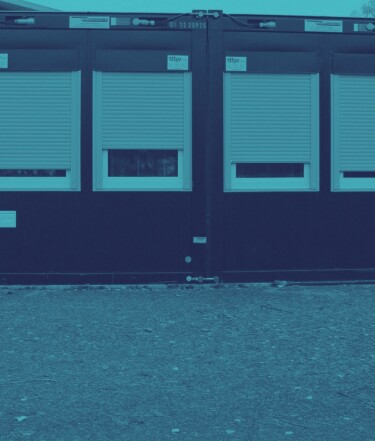
Police operations at the initial reception centre Ellwangen
The police stormed a refugee accommodation in Ellwangen without a search warrant. We support the complaint of a refugee against this violation of fundamental rights.
On 15 June 2023, the Federal Administrative Court heard our lawsuit against the large-scale raid in the Ellwangen LEA in May 2018. The subject of our lawsuit was firstly to confirm that the inviolability of the home also applies in principle to the rooms of refugees in initial reception facilities. The GFF was able to achieve this: The court clarified that, like private homes, rooms of refugees may only be entered in cases of urgent danger. However, the court considered an urgent danger to be sufficient for entering the room, but also necessary. This danger was given by the plaintiff's obligation to leave the country. An urgent danger, however, requires an exceptional situation in which an important legal asset such as life or limb is endangered. Only then can the intrusion into the private living space be permissible. Secondly, it should be established that entering a room in a refugee accommodation without a search warrant is unlawful. However, the court did not confirm this, but approved the practice of searching dormitory rooms for the purpose of deportation at any time of the day, even without a judicial search warrant.
Accordingly, the court considered the inviolability of the home to also apply to the rooms of refugees in initial reception facilities. It thus clearly rejected the opinion of the lower court, according to which - similar to business premises - the full protection of Article 13 of the Basic Law did not apply to rooms in dormitories. However, it did not consider the police measure to be a search, which, according to the Basic Law, always requires a court order. Since the small room could be surveyed at a glance, no search had been necessary. The court thus undermines the protection of living space in small flats. The GFF now filed a constitutional complaint together with PRO ASYL and the plaintiff Alassa Mfouapon.
Searches without a court order
On 3 May 2018, a massive police operation took place at the initial reception centre Ellwangen. The rooms of all residents were searched, identity checks were carried out and many residents were handcuffed. The reason was the deportation of a man from Togo, which had failed a few days earlier due to the peaceful resistance of the residents. Between 500 and 600 police officers searched the residents' rooms, including with special units and police dogs. Due to their aggressive approach, 40 unlocked doors of the accommodation were damaged. The police did not produce the necessary warrant for any of the searches.
One of the leaders of the refugees' resistance, Alassa Mfouapon, was taken away from the facility and deported on 20 June 2018. Again, there was no court order to search his room; he was also handcuffed by the police officers so severely that he sustained injuries. In September 2018, Alassa Mfouapon filed a complaint against the police measures before the Stuttgart Administrative Court. The GFF has been supporting the lawsuit since February 2019.
Partial successes infront of the administrative courts
On 19 February 2021, the Stuttgart Administrative Court ruled (AZ 1K9602/18): The large-scale raid in May 2018 at the Ellwangen initial reception centre was disproportionate and thus unlawful. However, the court was of the opinion that bedrooms in refugee accommodation are not protected flats in the sense of the Basic Law. A search warrant had not been necessary - not even for the deportation on 20 June 2018. The judgement thus fell far short. The rooms in refugee accommodation are private living spaces and as such the right to inviolability of the home applies to them.
With the support of the GFF, the plaintiff appealed against the ruling to the Administrative Court of Baden-Württemberg. On 28 March, the Administrative Court ruled that the rooms in refugee accommodation were indeed protected living spaces in the sense of Article 13 of the Basic Law. However, the court considerably restricted the protection of fundamental rights. The police were still allowed to enter the rooms, even if there was no urgent danger. A search warrant was not needed if the police wanted to deport a resident at night. After all, the rooms were so small and clearly arranged that no search was necessary (AZ 1 S 1265/21). The Federal Administrative Court heard the appeal filed against this decision on 15 June 2023.
Refugee accommodation as private homes
Rooms in collective refugee accommodation are dwellings under Article 13 of the Basic Law and are therefore subject to special protection. The inviolability of the home is a fundamental right that is closely linked to human dignity. The protection of the home also protects the right to a dignified life. The Federal Constitutional Court therefore interprets the concept of the home broadly. The protection extends to all rooms in which private life unfolds. Applying these guidelines, specialised courts have already recognised rooms in student dormitories, in a clinic and in accommodation for the homeless as housing. Various administrative courts and most recently the Higher Administrative Court of Hamburg have also granted the protection of the home to rooms in collective accommodation for refugees.
This protection must apply without restriction. There must be no second-class protection of fundamental rights for refugees.
A DEPORTATION FROM THE BEDROOM IS A SEARCH OF THE FLAT
If the police enter a bedroom in a refugee accommodation to deport a resident, it is a search and a warrant is required.
The inviolability of the home applies regardless of how large the room is. It also does not matter whether the person to be seized is recognisable at a glance or is in an area separated by a privacy screen. Otherwise, the protection of fundamental rights would depend on coincidences such as the size and manageability of a flat.
Rather, the purpose of the measure is decisive: If the purpose of the police entering the flat is to find a person or an object, then it is a search.
This is also the view of the OVG Hamburg. In a similar case conducted by Fluchtpunkt Hamburg, the court found a deportation unlawful in August 2020 (OVG Hamburg, judgement of 18 August 2020 - 4 Bf 160/19; VG Hamburg, judgement of 15 February 2019 - 9 K 1669/18 -, juris). The police had entered the room of an Iraqi couple with three children in the early hours of the morning and without a court order in order to deport the family.
The OVG Hamburg confirmed: Accommodation for refugees is a home according to Article 13 of the Basic Law. If the police enter them in order to pick up someone and take them away with the aim of deporting them at a later date, this is a residential search.
We aim for a landmark judgment against the unlawful deportation practice
The inviolability of the home is one of the fundamental rights enshrined in the constitution. The home should provide a place of retreat for all people. The government may only interfere with this right in exceptional cases. With the current deportation practice, this right is systematically violated. In both Hamburg and Baden-Württemberg, the police continue to believe that the homes of refugees are not protected by fundamental rights. Room searches for the purpose of deportations continue to take place without a search warrant.
This practice has now been legalised: section 58 (5) of the Residence Act stipulates that when the police enter a flat for the purpose of deportation, it is merely a case of "entering". This undermines the protection of the home.
A decision by the highest court is therefore urgently needed in order to put an end to this unlawful deportation practice throughout Germany.




